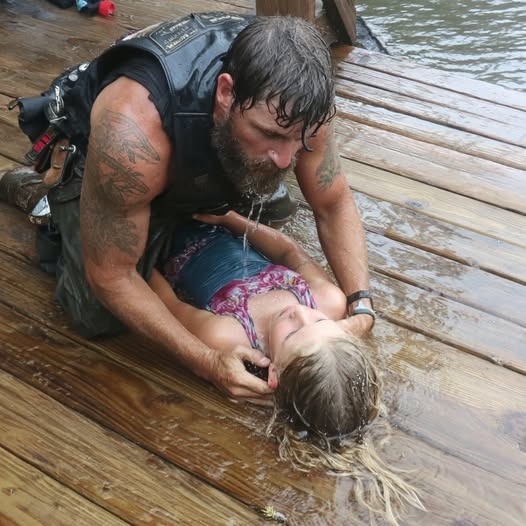The day my daughter Emma nearly drowned is seared into my memory. At a church picnic, she slipped beneath the dark water of the lake, and I dove in after her, my hands grasping uselessly in the murk. When I surfaced, gasping and desperate, a scene was unfolding on the dock that felt both terrifying and miraculous. A large man in a leather vest, covered in tattoos, was performing CPR on my little girl’s lifeless body. While other adults stood frozen in panic, this stranger worked with a focused calm, his hands pushing rhythmically on her small chest. Then, the most beautiful sound: Emma coughed up water, gasped, and began to cry. As I scrambled to hold her, the man simply stood and walked away without a word.
I was left clutching my saved daughter, overwhelmed with gratitude and a desperate need to thank the man who had vanished on a black motorcycle. In the following months, my search became an obsession. I was a teacher in a small town where everyone knew everyone, yet no one knew this biker. I gave newspaper interviews, posted on social media, and even visited the police, but he had disappeared without a trace. My ex-husband thought I should let it go, but I couldn’t. How do you move on when the person who gave you back your most precious gift remains a ghost?
A chance encounter in a grocery store finally broke the case. I saw a man in a similar leather vest and, throwing caution to the wind, I approached him with my story. His name was Marcus, and his demeanor softened when I showed him a picture of Emma. He was part of a network of riders and promised to put the word out. He warned me that some men don’t want to be found, but I didn’t care. I just needed two minutes to say “thank you.” Two weeks later, my phone rang with the call I had been praying for. It was Thomas Reeves, the mystery biker himself.
We arranged to meet at a small diner. Emma, wearing her favorite yellow dress, brought him a rainbow-colored drawing that read “THANK YOU.” As we sat in the booth, I learned the profound reason he had fled that day. Twenty years earlier, on the very same date, his own seven-year-old daughter, Sarah, had drowned in that same lake while he was deployed overseas with the Marines. He visited every year on the anniversary to mourn. Saving Emma was a chance to rewrite a tragedy he had carried for two decades, a moment of painful redemption he couldn’t bear to face in the aftermath.
Thomas didn’t disappear after our meeting. Our gratitude and Emma’s innocent affection convinced him to stay. He moved to our town, becoming an honorary uncle to Emma. He now attends her soccer games and school plays, a quiet, steady presence in our lives. He still grieves for Sarah, but he has told me that Emma gave him a reason to stop counting the years since his daughter died and start living again. He is a hero not because he sought glory, but because he acted when no one else would, and in saving my daughter, he began to save himself.


